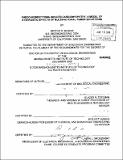Pheochromocytoma-induced cardiomyopathy : a model of synergistic effects of multifactorial tumor secretions
Author(s)
Mobine, Hector R
DownloadFull printable version (9.158Mb)
Other Contributors
Massachusetts Institute of Technology. Dept. of Biological Engineering.
Advisor
Elazer Edelman and Robert Langer.
Terms of use
Metadata
Show full item recordAbstract
One specific thesis of pathogenesis holds that diseases are dependent upon the complex interactions of multiple compounds and cofactors. While one agent may dominate, its powerful effects are mediated by ancillary factors that alone may have no discernible action. We examined this paradigm by comparing catecholamine-infusion induced cardiomyopathy with the organ disease observed by catecholamine-secreting pheochromocytoma cells. Pheochromocytomas are widely believed to induce cardiomyopathy via hypersecretion of catecholamines including norepinephrine (NE). NE can have direct cardiomyocyte toxicity and can stimulate myocardial remodeling secondary to the induction of hypertension. Yet, cardiomyopathy development is not entirely related to catecholamine dose. To explore these effects we engineered a polymeric cell encapsulation system to control PC12 cell kinetics and NE release in vitro and in vivo. We demonstrated that pheochromocytoma-conditioned media induced greater cardiomyocyte contractility and cytoskeletal remodeling than NE alone. We next examined the cardiomyopathy development in animals implanted with agarose- encapsulated pheochromocytoma (PC12) cells, DOPA decarboxylase knock-out PC12 cells deficient in norepinephrine (PC12-KO), or norepinephrine-secreting pumps. Implanted PC12 cells induced a greater degree of cardiomyopathy than animals dosed only with norepinephrine. Elimination of norepinephrine secretion in PC12-KO cells eliminated the effects of PC12 cells, while reintroduction of NE secretion via NE secreting pumps implanted alongside PC12-KO cells induced a cardiac pathology similar to intact PC12 cells. In the second portion of this work, we examined the role of pregnancy in our disease model and its ability to exacerbate pheochromocytoma-induced cardiomyopathy. Gravid pheochromocytoma-bearing mice experienced a greater loss of cardiac function and increased expansion of cardiac volume compared to non-gravid pheochromocytoma- bearing mice. Our data suggest that it is the confluence of these factors that enable the synergistic induction of myocardial injury. The implications of our work lie not only in a better understanding of pheochromocytomas and their secretory products but also in the differences between cell-secreted substances and their exogenous analogues in isolation.
Description
Thesis (Ph. D.)--Massachusetts Institute of Technology, Dept. of Biological Engineering, February 2009. Cataloged from PDF version of thesis. Includes bibliographical references (p. 116-126).
Date issued
2009Department
Massachusetts Institute of Technology. Department of Biological EngineeringPublisher
Massachusetts Institute of Technology
Keywords
Biological Engineering.